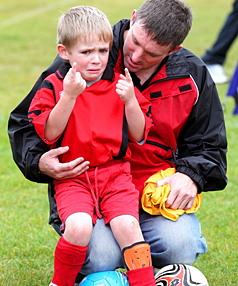My son cries about the water bottle I pack in his backpack.
He cries about having to read each morning.
He cries at soccer – when his team loses AND, at times, when they win.
He cries on the field if he feels he was fouled.
He cries during front yard touch football with his brothers.

If his teacher sends home a note saying that story problems are a struggle, he cries then, too.
All the while, there is a mental dual happening in my head – I simultaneously think two divergent thoughts:
- (1) Oh my God – he is SUCH a cry baby, and,
- (2) Crying means he cares, so I make excuses, like:
“He’s just super competitive.”
“He’s a perfectionist.”
“I guess it’s good that he cares enough to get this emotional.”
And, because I want to give my kid the benefit of the doubt, I err on the side of assuming that his drive to be the best has him descending into tears on a daily basis.
Really?
Is this omnipresent crying a good sign of strength of will – or, maybe, the complete opposite?
What the Experts Say
The prevailing view of dealing with a sensitive child is to thread very lightly. After all, no parent wants their son or daughter to feel alienated because they expressed emotion. In particular, articles dot the internet about thwarting the emotional health of a boy by telling them to dry their tears. There continues to be gender specific differences in handling flair-ups amongst boys and girls.
Crying is certainly normal. Does that fact, though, have parents putting up with too much in the hope that our littles ones will eventually be appropriately sensitive teens and young adults?
From my point of view on the sidelines, I think so.
Is it okay to tell your kids to QUIT CRYING?
If you want to see any fellow parent recoil, try screaming at your child to “STOP CRYING!!!” in public. Today, demanding that your kid dry up their tears in a public setting seems as taboo as refusing the after-soccer-match Oreo snack on your kid’s behalf at 8 am.
I see the same script playing out:
- Act I: child cries over something minor
- Act II: parent swoops in to assess
- Act III: child continues to cry, parents distracts, or remedies the problem
- Act IV: repeat Act I twenty minutes later
I can accept crying as a defense mechanism for toddlers, but for kids of school age this needs to stop. At times, I want to scream, “Tell your kid to stop crying for God’s sake!”
If your child is hurt, by all means, they should cry.
If your kid is lost, please, scream and wail.
But, missing a goal in soccer or striking out in baseball? Come on.
Waiting impatiently for a swing at the park? No way.
Parents should support the emotional well-being of our kids – no question. Let’s stop short, though, of saying that putting up with overly emotional behavior in relatively meaningless situations helps build a foundation for well adjusted, emotionally tuned-in young adults.
It is okay to tell your child to stop crying every time something doesn’t break their way – in sports, school, at the park, or at home. Telling your kids to stop crying in these situations can actually help them see the bigger picture.
If you tell your child to stop crying, you may be able to test their fortitude for what is upsetting them. If they carry on the entire car ride after the soccer game, maybe your little Messi is truly disappointed, overly competitive, or feeling undue pressure to perform. If he/she stops upon request, maybe they just wanted your attention after the game.
Telling a child that resorting to crying is fine no matter what distorts their view of life events that are worthy of their heightened emotional responses – the big deal stuff like someone getting injured or the loss of a family member.
Now what?
No expert can assess the needs of your child and, of course, all of our little ones are different. Handling obsessive crying by kids old enough to communicate more effectively might involve a self-assessment.
Parents are our children’s ultimate role model for emotional awareness. If we scream at the umpire from the stands or find ourselves quickly frustrated by their lack of understanding of simple math, their responses are elevated. They feel that pressure, and in doing so, we have given these relatively meaningless moments far too much power.
Conversely, if we get excited about things that REALLY matter – school citizenship, being a good steward of the environment, fostering solid friendships, and treating everyone with respect – our kids can file these activities and behaviors as those worthy of giving more of a sh*t about.
We have to help our sensitive little ones through – but not by watching the same, unnecessary crying play out day after day (after day, after day).
My kid, like yours, is not crying because they are so competitive and just want to win more than anyone else – at least not all the time. I should quit making those excuses for it.
After all, I don’t want to raise the cry baby. I’d rather bring up the kid who will put their arm around their overly-emotional teammate and say, “This too shall pass.”
